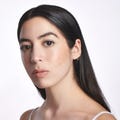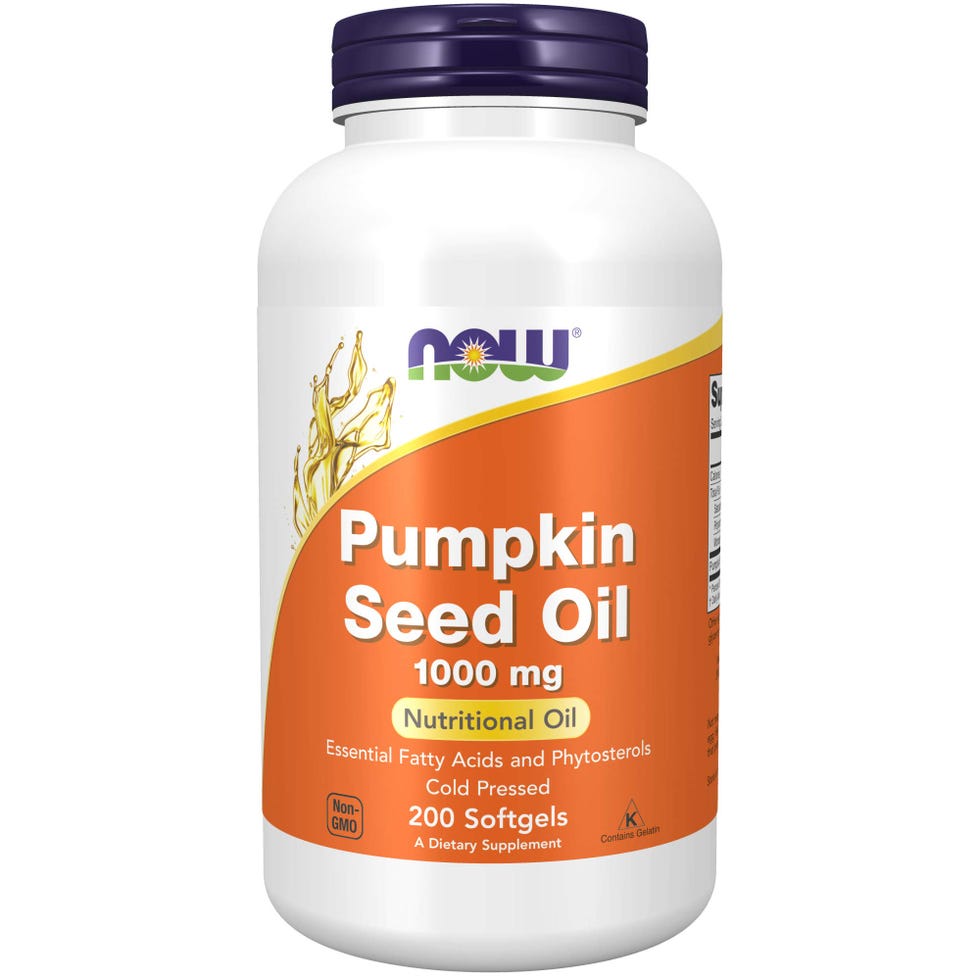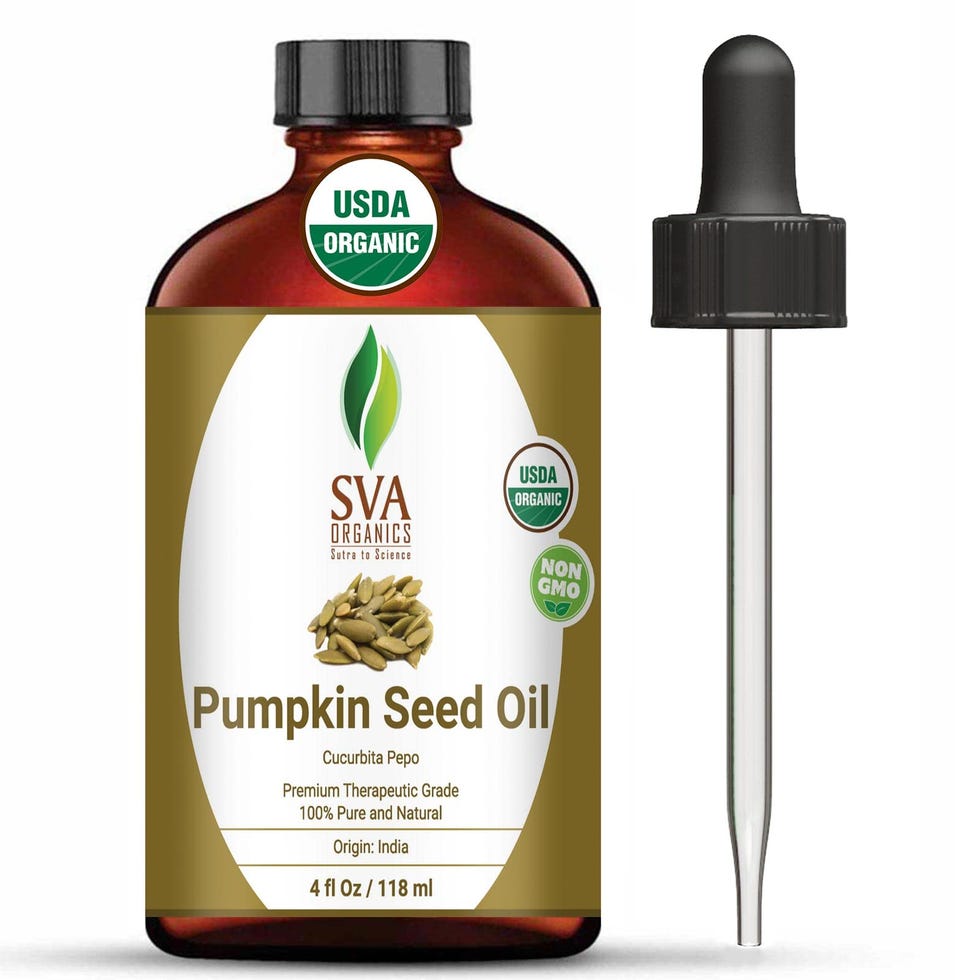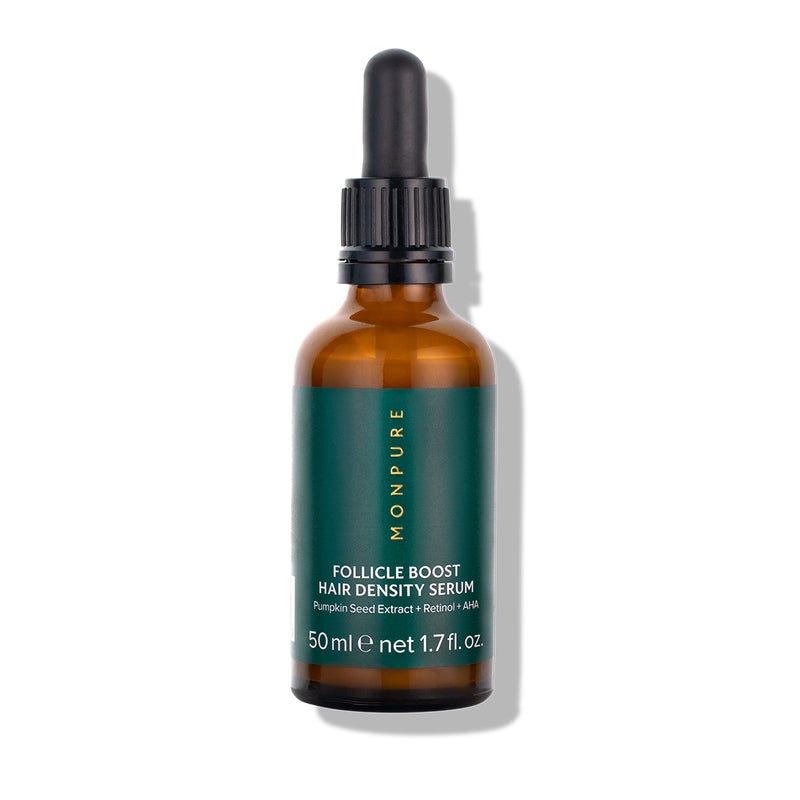Products You May Like
In the ever-evolving world of scalp health, pumpkin seed oil for hair has emerged as one ingredient users claim dramatically improves density, length, and growth rate of hair. Now rivaling rosemary oil and rice water for the new “it” product, we’re left wondering if pumpkin seed oil can really cause visible hair growth. Pumpkin seed oil–which, as the name suggests, is derived from the seeds of your favorite Halloween decoration. You may have spotted it at a grocery store, but some people have been directly applying the oil to their scalp, while others believe that ingesting a capsule actually yields better results. Now that there are anti-thinning shampoos, hair growth supplements, and a slew of scalp serums, it’s time to find out if pumpkin seed oil should really be in your haircare routine.
What are the benefits of pumpkin seed oil for hair?
Pumpkin seed oil has packed with nutrients, some of which are used on their own for hair and scalp health. “Pumpkin seed oil is an amazing source of essential fatty acids, including omega-3 and omega-6 fatty acids, all of which are crucial for maintaining a healthy scalp and promoting hair growth,” says Sofia Baig, a trichologist and hair loss specialist at Monpure. She adds, “This clever extract contains several nutrients and antioxidants that are beneficial for our hair, including vitamins A, E, and K, as well as minerals such as zinc and magnesium. Pumpkin seed oil also contains compounds that possess anti-inflammatory properties, which help soothe irritated or inflamed scalp conditions, such as dandruff or scalp psoriasis.”
According to dermatologist Dr. Karan Lal, pumpkin seed oil also has DHT blocking properties. DHT, also known as dihydrotestosterone, is the male sex hormone, or androgen, responsible for male pattern baldness. A DHT blocker, in essence, helps block that androgen from minimizing hair follicles, reducing hair loss in men.
Along with improving scalp and hair health, pumpkin seed oil can also help the overall appearance of your hair. “Pumpkin seed oil also has suburb moisturization properties that deeply nourish the hair and adds shine without weighing down the hair strands,” says Kimberlee J. Blakley, celebrity hairstylist, trichologist, and Senior Director of Development at MAV Beauty Brands.
Does pumpkin seed oil reverse or delay hair loss?
As with all hair loss remedies, there is no such thing as immediate results, and several factors are often at play. “Recent hair loss research has shown that pumpkin seed oil blocks the production of DHT, the hormone responsible for hair loss. It naturally targets the hair growth cycle–initially targeting the catagen and telogen phases, working to minimize excess shedding. It then boosts the growth of follicles entering into a new cycle of the anagen phase. It’s an incredible natural solution against hormonal hair loss, such as thinning during menopause and after women give birth. It is a powerful anti-inflammatory that decreases oxidation, which also combats hair loss,” says Baig.
However, not all hair loss is the result of hormones. “Pumpkin seed oil is best for those with male or female pattern alopecia–meaning hormonally mediated hair loss. In men, this hair loss presents with recession of the hairline and hair thinning on the crown whereas for women it presents with thinning and increased scalp show in the front of the scalp. Studies reporting benefit saw such benefit at daily doses of 400mg,” says Dr. Lal.
If your hair loss is unrelated to hormones, though, you may still see some benefits from applying pumpkin seed oil. “Many factors contribute to hair loss and thinning, including diet, sleep habits, genetics, hormones lifestyle, and underlying health issues. Including products that are rich in pumpkin seed oil into your regular haircare routine will help to support and nourish the hair and scalp, along with managing your sleep and eating habits and regular visits to the doctor,” adds Blakley.
Is it better to apply or ingest pumpkin seed oil?
Pumpkin seed oil can be found in a myriad of different forms, including as ingestible capsules, pure oil, or incorporated into hair products as a key ingredient. Deciding which method to use pumpkin seed oil really comes down to personal preference. “Pumpkin seed oil has been show in studies to grow hair orally and topically in those with hormonally mediated hair loss. In a placebo controlled study that enrolled men with hormonally mediated hair loss there was 40% average increase in hair count compared to 10% in placebo. Both oral and topical administration has shown to be beneficial but we can’t say for sure one is better than the other,” says Dr. Lal.
By applying pumpkin seed oil directly onto the areas you want to treat, you may notice a more direct benefit. “As a trichologist, I’ve found that when applied topically, pumpkin seed oil can directly nourish the scalp and hair follicles, providing localized benefits that improve scalp and hair health. Both methods can be beneficial, but topical application targets the hair and scalp specifically, while ingestion provides a more systemic approach,” says Baig.
Timing is also a factor, since supplements take time to go into effect. Also, finding the right dose for ingesting pumpkin seed oil may require a trip to your doctor. “Timing is the most significant difference when taking a pumpkin oil supplements versus a topical application,” says Blakley. She adds, “It typically takes about three months to see the benefit of ingestible effects on the hair. When using pumpkin oil topically, you can see the cosmetic effects in one use, while it will take 3-6 months and a healthy lifestyle to see the best results. For topical use, I have found that including the wonder oil in your favorite hair mask is a fantastic one-step easy application. I recommend chatting with your physician before adding new supplements to your routine. Proper dosing varies depending on weight and underlying health concerns or issues.”
Is pumpkin seed oil safe to use?
Whether you choose to ingest or apply pumpkin seed oil, it’s always important to talk to your doctor if you have any concerns. However, pumpkin seed oil is generally considered safe to use. “Pumpkin seed oil is safe, however some may experience stomach aches at the beginning [if ingesting], so just be mindful when starting. It can also lower your blood pressure, so if you are on blood pressure lowering medications, make sure to let your doctor know,” says Dr. Lal.
Shop our favorite pumpkin seed oil products here:
How should pumpkin seed oil be used?
Whether you decide to ingest supplements or apply the oil directly to your scalp and hair, there are some tricks to get the most out of this ingredient. And as with all hair loss routines, upkeep and maintenance will always be necessary. “I always say that ‘consistency is key’ when it comes to promoting hair growth,” says Baig.
“Pumpkin seed oil is excellent for all hair types and patterns,” says Blakley. She adds, “Pro tip: If applying raw pumpkin seed oil to the scalp for fine hair, it is best to apply the oil overnight to avoid greasy-looking roots. Before bedtime, apply pumpkin seed oil to the scalp and massage with your fingertips feel free to apply a sleeping cap or bonnet, or use an old pillowcase to avoid oil stains on the bedding. In the morning rinse shampoo, condition, and style as usual.”
Meet the Experts
Kimberlee J. Blakley is the Senior Director of Product Development at MAV Beauty Brands. She is also a licensed trichologist and licensed cosmetologist.
Sofia Baig is a trichologist and renowned hair loss expert at Monpure London.
Dr. Karan Lal is a double-board certified pediatric and cosmetic dermatologist based out of Arizona.
Why trust ELLE Beauty?
As a leading publisher of fashion, lifestyle, and beauty content, ELLE.com is committed to highlighting the best products in various categories by personally testing the latest and most innovative products, interviewing countless experts, and vetting customer-loved items. For this piece, Tatjana Freund consulted skin and hair experts to learn about the benefits of using pumpkin seed oil topically and internally in hair care routines.

Fashion & Luxury Commerce Editor
Tatjana Freund is Hearst’s Fashion & Luxury Commerce Editor, covering beauty, fashion and more across multiple brands. Previously, she worked at ELLE.com and Marie Claire. She’s a fan of whiskey neat, podcasts that give her nightmares, and one time Zoë Kravitz laughed at a joke she made.



